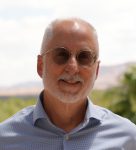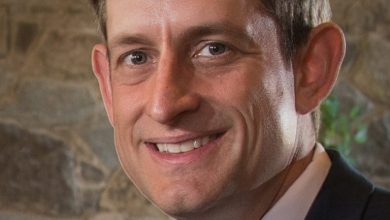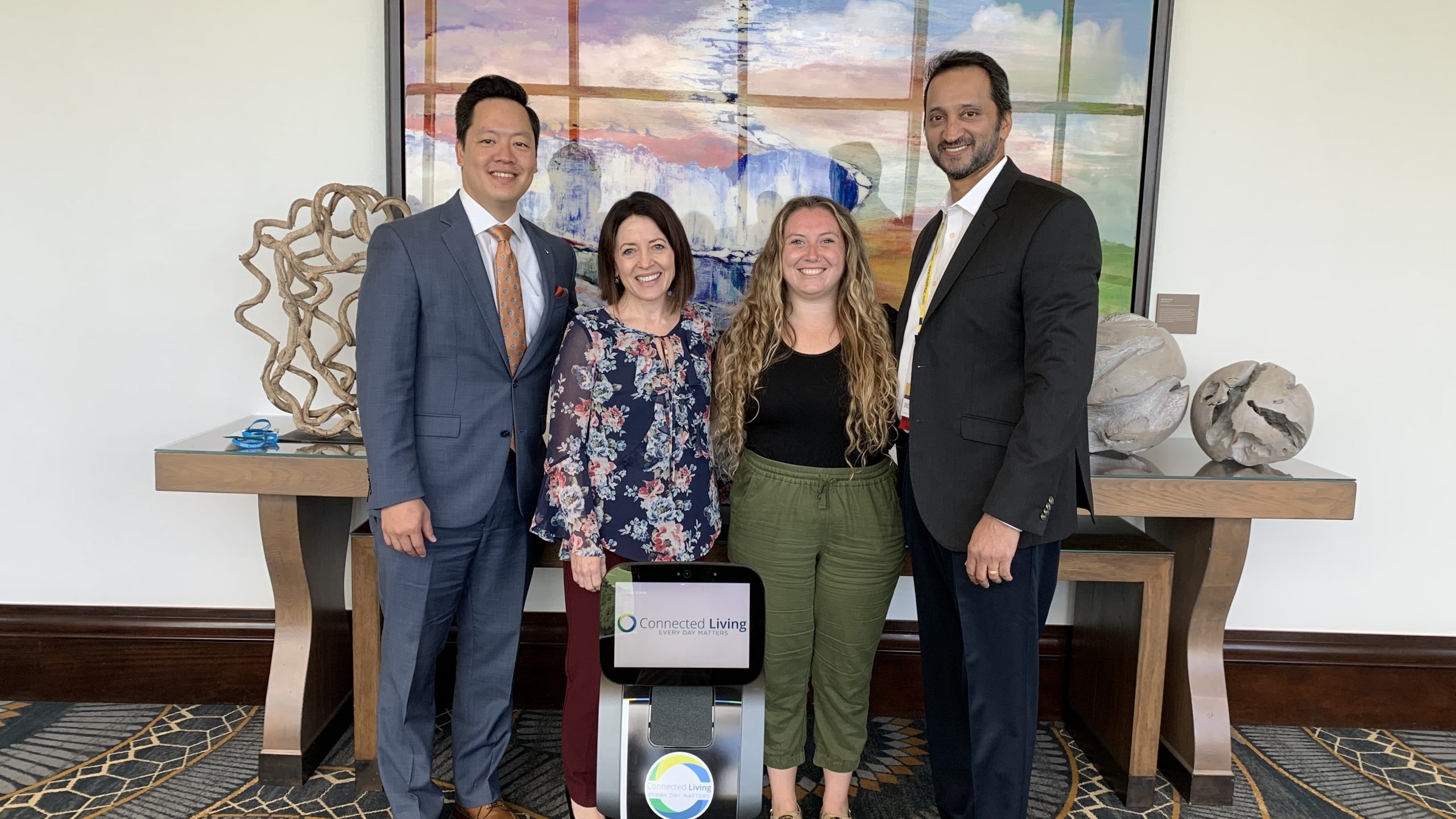
The CEO Series: Dwayne Clark, Áegis Living
By Jim Nelson | May 22, 2024
Let’s get one thing out of the way right off the bat: Áegis sounds like “Age Is.” Explains founder/CEO Dwayne Clark, “If you’re looking at proper Greek pronunciation, it’s Eegis, but that’s why we have a little accent mark — at times you’ll see that over the A to make the long sounding ‘A.’”
Bellevue, Washington-based Áegis Living has a lot going on, just like its founder. Most notable is the full-blitz ad campaign the company has just started that works off Clark’s philosophy that is prominently placed on its website: “There’s not much in life that we all have in common. Getting older is one of them. We start aging the moment we’re born. And if we’re lucky, we get to keep doing that for many years. Aging is a gift. And as soon as we recognize that we’re all aging together, we can lose the before and after perspectives. We can open our lives to those we are bound to become. We can spend our days loving and learning from each other. And take part in each other’s stories for as long as time allows. It’s that simple.”
 The new Áegis Living ad campaign, which was created by Little Hands of Stone after a recent two-day Montana retreat with Clark, is meant to be “category disrupting.” As America struggles with ageism on many levels, right on up to presidential politics, the new Áegis Living campaign cuts through it all with an attention-grabbing message: “Aging Is Life” and each of us is a “future old person.”
The new Áegis Living ad campaign, which was created by Little Hands of Stone after a recent two-day Montana retreat with Clark, is meant to be “category disrupting.” As America struggles with ageism on many levels, right on up to presidential politics, the new Áegis Living campaign cuts through it all with an attention-grabbing message: “Aging Is Life” and each of us is a “future old person.”
With 38 communities in Washington, California, and Nevada, and another one in construction and two more in development, plus having recently named celebrity doctor Dr. Raj as its new chief medical officer, Áegis Living has a lot going. To get to the bottom of it all, we spoke with Dwayne Clark.
SENIOR LIVING NEWS: What do you hope people take away from this new ad campaign?
DWAYNE CLARK: Well, Jim, I’ve been involved in senior housing for almost 40 years — I think this fall will mark my 39th year — and for far too long what we’ve seen is that once people reach a certain phase, we categorize them in a certain way: “Oh, that’s an aging person, that’s an old person, that’s a frail person.” I have a home in Italy, and I live there about six weeks of the year, and when I go to Europe, I don’t really see that; if you’re aged [there], you become an oracle, a person of wisdom, somebody that’s celebrated. It’s like they want to suck the knowledge out of these people, they’re revered. I try to be disruptive in how people think about aging. The reality is the minute we’re born we age, the minute we come out of our mom’s womb we’re getting older. You’re a minute older now than you were when you popped on the Zoom call with me.
So, we’re trying to restate what aging means and the best way to do that is show a baby being birthed and going, “This is a future old person.” Now, are you going to look at people differently and think about people differently as they age? Maybe. We hope so. That’s the message. And I have to tell you it’s getting an incredible response. I mean, our website is blowing up. We’re now making t-shirts and we’ve already started making onesies for babies that say, “Future Old Person,” and I think it’s really going to catch on. I think it’s an interesting concept.
SLN: I love the quote on the homepage of your website: “We start aging the moment we’re born. And if we’re lucky, we get to keep doing that for many years.” You’ve taken what is a dark and dreary prospect for most of us and turned it into something positive. I understand that the woman who spoke that on your radio spots is 100 years old.
DC: That’s not correct. She’s 101.
SLN: [Chuckles] And she’s one of your residents?
DC: Yeah. She sounds like Betty White when she talks.
SLN: Age is a gift, not a given, she says in your radio spot. You say that the website is blowing up from the campaign; how long are you planning to run it?
DC: Well, it’s going to be run an indefinite amount of time. But we’re surging. We’re probably spending a half-million dollars this month in terms of billboards, advertising, buses, TV, radio, newspaper, everything. So, in the next, I would say, four to six weeks, there’s going to be a surge. It’s a campaign that we’re going to stick with for a considerable time. We spent a lot of time on this. I brought the ad agency to my ranch in Montana, and I just said, “We’re not leaving this room ’til we get this right.” We were at my ranch for two days and I’d say, “No, that’s not it, that’s not it.” And so they redefined it, redefined it, redefined it. Our ad agency is called Little Hands of Stone and I really have to take my hat off to them because I’m quite stubborn about messaging and I don’t think they were accustomed to a CEO having such an opinion. I also own a film company — I’ve made 13 documentaries — so I have an opinion about things like music and how we use certain shots and so on, so that played into this to a great extent.
SLN: You’re also an author. How many books have you written?
DC: Five and working on my sixth and seventh now.
SLN: What kind of books are they?
DC: I don’t know if you’ve ever heard of a series called the Miracle Mornings by Hal Elrod. He’s an inspirational speaker. He approached me and said, “Why don’t we write a book together called Miracle Mornings for Seniors?” He’s got an extensive following, like three million people. So, that’ll come out probably next spring. And then I’m working on another book that I’ve been asked to do for about 10 years, and I just hadn’t had time; it’s called Where’s My Purse? It’s an all-inclusive guide for adults with aging parents about everything: about fraud, about when do we take the car away, about what to look for in assisted living, about what do we do if my mom starts dating at 80 years old, about how do we divide up the household goods? I think it’s got 40-some chapters in it, and I think it’s going to be a huge hit because no one’s ever done this before.
SLN: Let’s plan on talking about that too when it comes out. Not long ago, a gentleman who has credits as long as my arm, who everyone knows as Dr. Raj, came to work for you. How did you come to hire Dr. Raj as your chief medical officer?
DC: That’s funny you mentioned that, Jim. He’s got an incredible podcast, and he was doing his 100th episode and he honored me with being the guest on his 100th episode of his podcast. So, I just literally 45 minutes ago got off his podcast. He’s an incredible human being. I mean, enough energy to fuel a nuclear power plant for about 10 years.
We have an annual conference called EPIC — it stands for Empower People, Inspire Consciousness — and it has nothing to do with seniors or Alzheimer’s or senior housing or business or anything. It’s all about self-improvement, and if I told you the speakers that we’ve had over the course of the last 20 years, you would go, “No way.” We’ve had President Clinton; we’ve had Vicente Fox, the president of Mexico; we’ve had Geena Davis: we’ve had Carlos Santana; we’ve had Sylvester Stallone — I could go on and on and on — we’ve had over 100 A-list celebrities. Every year there’s a different theme and it’s usually about something that’s kind of profound. One year we had a theme, this was a popular one, on forgiveness and judgment. We brought in Amanda Knox, a friend of mine and I’ve mentored for the last five years; we brought in Monica Lewinsky — funny, they met at that meeting and now are co-collaborating on some things; we brought in Sonny Barger, who was the founder of the Hells Angels; we brought in Macklemore, the rap singer, who’s a good buddy of mine; we brought in all these controversial people. And the experiment was, now that you get to talk to them and meet them in a 100-person auditorium, do you have a different opinion of them? That was one of the experiences. Every year there’s a different theme. Just before COVID started it was about how do we take our health seriously and have a great healthspan, as opposed to lifespan? [Dr. Raj] was one of the speakers. And it was like we were brothers from another mother; we have a lot in common: both our parents were raised in India, and almost in the same town in India. So, we’ve kept in touch and became friends, and a few months ago I just said, “Why don’t you just come on as our chief medical officer? You don’t have to move, you can come up every other week and spend a few days and you can even keep some of your hours at the hospital, and we’ll make this work.” And he said, “I’d love to.”
SLN: What’s coming for Aegis? You just added two communities there in Seattle, and the one in Laurelhurst especially looks really interesting with your University of Washington motif. I saw on LinkedIn that you had some pictures of a crane that was dropping an RV down into the campus.
DC: Again, I think it goes with our disruptive theme. In our Alzheimer’s unit we have a mini football field with a goalpost and hashmarks, and everything else. We have a helmet car in our Alzheimer’s unit, and we bought a full size Argosy RV and opened it up so you can have tailgate parties in the RV.
The building we opened about six weeks ago in Ballard — Áegis Living Ballard — is a Scandinavian community, so we did everything Scandinavian. And they said, “What do you want for the wow factor?’ I said, “I want you guys to build a Viking ship and hang it from the ceiling.” And they always look at me like I decided to smoke crack for the weekend or something, like “What is he on?” We build to the neighborhood, right? We make the audacious assumption that people live in the neighborhood because they like it, and if they like it, what are the themes and factors and icons and businesses? We go to the extent of going back into history books and seeing what the name of the theater was in the 1940s, and we name our theater that name so that there’s this familiarity that comes out with people. In our movie theaters we have a concession stand and we were putting treats and candy in there, and I said, “That’s not good enough. I want our 80-year-old residents to have a moment of joy. I want them to see the candy like they did when they were 10 years old. I want you to find a company that will package the candy like it was 75 years ago.” Again, we have to sell trust, right? We have the ability to do that, so when they come in and we explain the candy, they’re like, “Oh my god, you go to that level of detail? Well, if you can do that, I trust you.”





